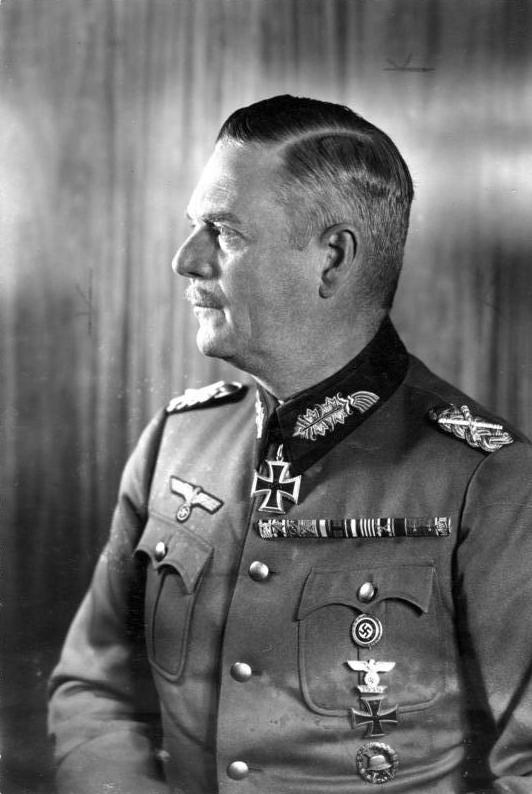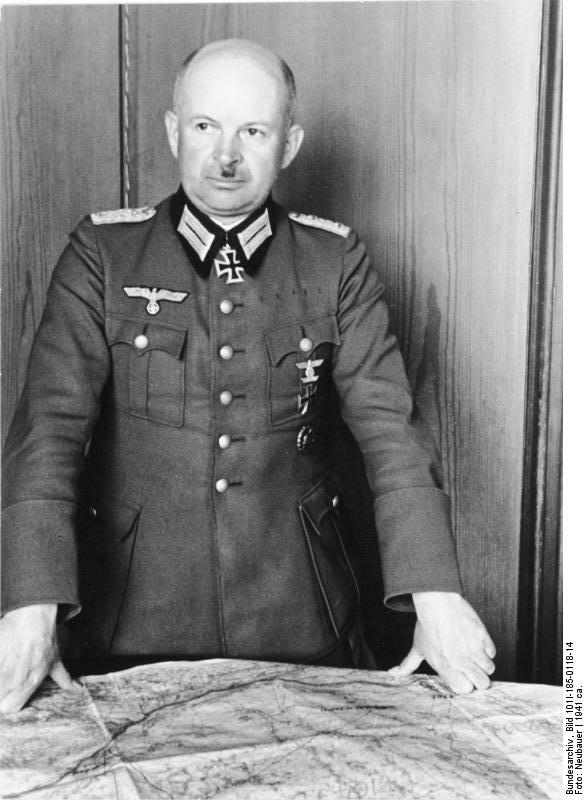Conference of the Fuehrer with General Field Marshal Keitel and General Zeitzler on 8 June 1943 at the Berghof— Extract from stenographic notes.
[Page 6] The Fuehrer: * * * I can only say: we will never
build up a Russian army, that is a phantom of the first order. Before we will do so, it will be much simpler if I get the Russians as workers in Germany; that is much more decisive. I don't need a Russian army which I have to strengthen with German corset stays through and through. It serves my purpose if I get Russian workers instead. Then I can release the Germans and reeducate the Russians. For us the most successful thing lies in the production of the Russian workers who are employed in Germany; of course, we have to feed them in a different way if we thrust a maximum amount of work upon them.
[Page 12] He said: Here, I lose 500,000 Jews. I must take them away, because the Jews are the element of revolt. But in my area, actually, the Jews were the only tradesmen. Now they want to set up high schools and grammar schools, thereby building here, a national Ukrainian state, that should in the future, fight against Russia. I am not even in a position to have the worker, who must work here, have his boots repaired. I can't do that because the tradesmen are no longer here. The Jews are all gone. What is more important, that I train the Ukrainians how to mend boots, or that I send them high schools so that they can build up the Ukrainian state?
[Page 25 | Keitel: Now about the employment of people from deserters camps.
Fuehrer: I am of the opinion that they should be transferred to Germany and used there. They are prisoners of war. If I only could transfer 30, 40 or 50,000 men to the commissioner for coal production! But then they will have to be treated really in a decent way.
959
1384-PS
1384-PS
Zeitzler: I have set as my goal that they should become decent workers in Germany. We can't do much with deserters at the front. I can commit a few of them as volunteers for replacements. But the majority should go to Germany as workers in order to release Germans.
Fuehrer: I can only say: if we do not straighten out our coal affairs, the moment will arrive when I shall not be able to produce either ammunition or explosives anymore, nor will we be able to build submarines. This will happen in 100 other fields too. It is idiotic. But the moment will arrive. It is already tragic when the Italians come and ask us why do we not deliver this or that. I have to deliver it. We cannot, because we haven't got enough coal. That is sloppy, of course.
Extract from notes of a conference of Hitler, Keitel, and Zeitzler, on the use of Russians, Ukrainians, and deserters as workers (particularly to produce coal), and the loss of 500,000 Jews in the Ukraine
Authors
Adolf Hitler (Fuehrer, Reich Chancellor, Supeme Commander of Wehrmacht)
Adolf Hitler
Austrian nationalized German politician, leader of the National Socialist party and dictator of Germany (1889-1945)

- Born: 1889-01-01 1889-04-20 (Braunau am Inn) (country: Austria-Hungary; located in the administrative territorial entity: Archduchy of Austria above the Enns; statement is subject of: Adolf-Hitler-Geburtshaus)
- Died: 1945-04-30 (Berlin Führerbunker) (country: Nazi Germany; located in the administrative territorial entity: Berlin; statement is subject of: death of Adolf Hitler)
- Country of citizenship: Cisleithania (period: 1889-04-20 through 1918-11-11); First Republic of Austria (period: 1919-01-01 through 1925-04-30); Nazi Germany (end cause: death of Adolf Hitler; period: 1933-01-30 through 1945-04-30); Republic of German-Austria (period: 1918-01-01 through 1919-01-01)
- Occupation: painter (statement is subject of: paintings by Adolf Hitler); political writer; politician (reason for preferred rank: generally used form); soldier
- Member of political party: German Workers' Party (period: 1919-09-12 through 1921-07-11); Nazi Party (series ordinal: 556)
- Member of: Nazi Party
- Participant in: Aktion T4; Beer Hall Putsch; The Holocaust; ethnic cleansing
- Significant person: Albert Speer; Benito Mussolini; Eva Braun; Joseph Stalin
Wilhelm Keitel (Field Marshal, Chief of the High Command of the Armed Forces)
Wilhelm Keitel
German field marshal

- Born: 1882-09-22 (Helmscherode) (country: German Empire; located in the administrative territorial entity: Duchy of Brunswick)
- Died: 1946-10-16 (Nuremberg) (country: Allied-occupied Germany)
- Country of citizenship: Germany
- Occupation: military officer; military personnel; politician
- Member of political party: Nazi Party
- Military rank: general field marshal
- Military branch: artillery
- VIAF ID: https://viaf.org/viaf/74027425
Kurt Zeitzler (general, operations staff officer, High Command)
Kurt Zeitzler
German General

- Born: 1895-06-09 (Heideblick)
- Died: 1963-09-05 1963-09-25 (Aschau im Chiemgau)
- Country of citizenship: Germany
- Occupation: military officer
- Military rank: Generaloberst
- Military branch: German Army; Imperial German Army; Reichswehr
- VIAF ID: https://viaf.org/viaf/961095
- ISNI: https://isni.org/isni/0000000054350808
Date: 08 June 1943
Literal Title: Conference of the Fuehrer with General Field Marshal Keitel and General Zeitzler on 8 June 1943 at the Berghof - Extract from stenographic notes.
Defendant: Wilhelm Keitel
Total Pages: 1
Language of Text: English
Source of Text: Nazi conspiracy and aggression (Office of United States Chief of Counsel for Prosecution of Axis Criminality. Washington, D.C. : U.S. Government Printing Office, 1946.)
Evidence Code: PS-1384
HLSL Item No.: 451045
Notes:This document was not entered as evidence in the trial. The document does not state what happened to the Jews who were removed.